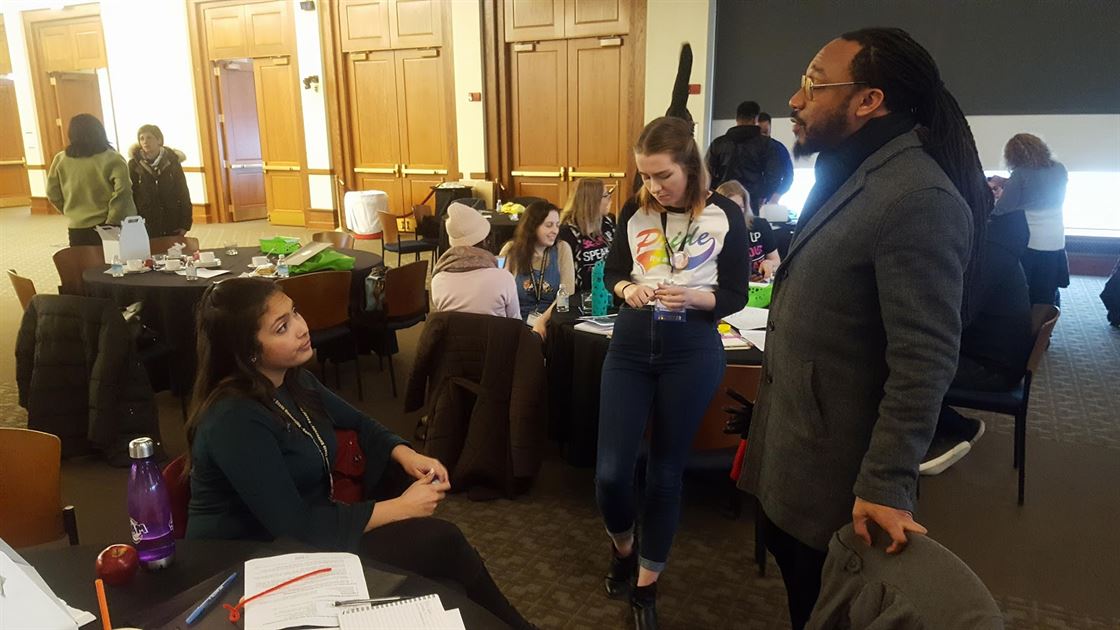The Office of Equity and Diversity hosted their second annual Social Justice Conference last week. This year’s event was marketed as a Social Justice Institute and followed a much different and more interacting format than last year’s conference.
Dr. Sidney Gardner, director of the Office of Equity and Diversity explained some of the differences from last year in her opening address.
“We have multiple identities, multiple issues that we feel passionate about, multiple things that we’re carrying with us,” Gardner said. “We really felt we needed to provide this kind of space where we could come together and figure that out together.”
The space, which allowed people at the event to easily interact with one another, was different from a typical conference in which people in attendance mostly listen to guest speakers.
Following her welcoming speech, Gardner introduced the event facilitator, Saby Labor. For the rest of the event, Labor led everyone in attendance in various discussions and collaborative activities. These activities emphasized community, empathetic listening and validation of people’s experiences and identities.
Deanna Mendez, a graduate student in the Department of Early Childhood, Elementary and Literacy Education was pleased with the diversity reflected in the event.
“As a future educator I’m aware that I’m going to have students of all different abilities, backgrounds, culturally, religiously, racially,” Mendez said. “So I want to be aware of what other issues are going around for those groups so that I can be a more proactive advocate for my students in the future.”
Some discussions covered issues such as lack of accessibility and accommodations for students with physical and neurological disabilities or larger body sizes, the lack of political involvement on the Student Government Association (SGA)’s behalf, exclusion of transgender individuals and lack of diversity in professors working at the school.
Jessica Restaino, an associate professor of writing studies and the new director of gender, sexuality, and women’s studies thought the Social Justice Institute was helpful for being able to better understand students.
“I hope that, as a faculty member, I might be able to share with my faculty colleagues the importance of something like this,” Restaino said. “It’s a really great opportunity for us to connect with students and hear from you and think together.”
During the event, people were asked to form various groups to create action plans for resolving issues mentioned earlier.
Reggie Walker, an educational opportunity fund counselor who attended the event, hoped that students would be inspired by the event to become more active in their support for social justice.
“I want students to be able to recognize the power that they have as students to make a change,” Walker said. “Not just at Montclair State, but outside of the Montclair State community and utilizing the conference as a vehicle to empower them and equip them with the tools necessary to go out there and make some change.”
Although many concerns were brought to attention, people like Karmyn Ramirez, a senior studying gender, sexuality, and women’s studies and member of the SGA, felt that Montclair State typically does a good job of addressing issues of social justice.
“My experience has been good, I do think things can be better,” Ramirez said. “It’s really about coming to spaces like this one where we can all talk about it, and hopefully the administrators that are here, the student leaders that are here, can take what they learned from here and implement that change on campus.”
Emma Iacometta, a senior studying general humanities, felt similarly and believed that more student involvement could improve many of the issues discussed.
“There are students that just don’t show up to these events and don’t necessarily work on things that they see issues with,” Iacometta said. “It’s easy enough to say that I see an issue on campus, but it really takes someone to take the next step and approach someone.”
Student involvement played a large role in organizing the Social Justice Institute. The Office of Equity and Diversity worked closely with a multicultural council consisting of student leaders from many different backgrounds and walks of life.
The multicultural council has regular meetings on Fridays and throughout their next five meetings, they will discuss plans to resolve issues discussed at the Social Justice Institute. Labor will also attend the meetings via video chat to help the council with any questions or difficulties they may face.
“The students at Montclair State are powerful,” Labor said. “I’m excited about the issues that were discussed, and I’m excited about how the students will work with these issues moving forward.”



